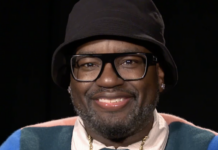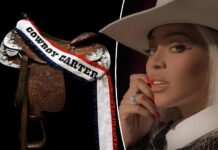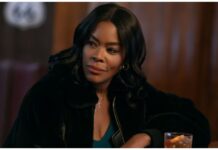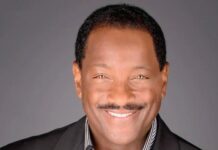
*EUR/Electronic Urban Report caught up with Kelsey Scott to dish about the 2017 Emmy nominated show “Fear the Walking Dead: Passage,” and her nomination for Outstanding Actress in a Short Form Comedy or Drama Series.
“Passage” is mini-series produced by AMC for AMC.com that follows Sierra (Scott), a fearsome survivor of an undead apocalypse, who takes an injured woman, Gabi, (Mishel Prada) under her wing during her search for sanctuary. Over the course of their harrowing journey, the women go on to face many dangers and learn what they need to survive.
Produced by “Fear the Walking Dead” showrunner and executive producer Dave Erickson, “Passage” has been honored with two nominations at the 2017 Emmy Awards, including in the 2-year-old category, Short Form Video. It follows the sixteen-part miniseries “Fear the Walking Dead: Flight 462,” which ran last year on AMC and online.
Scott is a writer and producer best known for her role as Anne Northup in the OSCAR-winning “12 Years A Slave” and as Wes Gibbins’ mother, Rose, on “How to Get Away With Murder.”
When we asked the actress if she believes award ceremonies such as the Emmy’s are just as important as the work that actors put out, she replied:
“I think it’s a different category, honestly. I think that awards are two-fold. One, they are, obviously, validation of your work and recognition by your peers and that’s very important. They’re also kind of a calling card to industry people who might not be familiar with your work, that “Hey, this person is out there doing something and their peers think it’s worthy of recognition, perhaps you should pay attention to them and provide some sort of opportunity.” And so I think that both of those have a connection to the work but the work is its own entity. It is important because of what it is all by itself and doesn’t actually require awards, cause there are plenty of talented artists out there who have not received awards but it doesn’t mean they’re not worthy of them.”
Peep the rest of our conversation with Kelsey Scott below.
OTHER NEWS YOU MIGHT HAVE MISSED: ‘Downsized’ Star Nicole Ari Parker Says Role Reflects ‘A Moment In My Personal Life’

The series left me wondering about what lies ahead for you and Mishel’s characters. Are you just as curious to know what the future holds for Sierra?
Kelsey: Oh, of course. And Sierra was fun to play, just that velocity of spirit that’s just delicious for an actor. I loved the relationship that Sierra and Gabbi formed — going from complete mistrust to depending on one another. So I would love to see where their story leads and there’s always an opportunity that the network will explore that. I know in the first iteration of the websites last year, the characters did go on to the actual long-form series and we got to see a bit more of their lives. So there’s a chance that we might see more.
When we meet Gabi, she’s scared, lacks confidence and she’s not as brave as Sierra, who’s the complete opposite. So what does Sierra fear before she meets Gabi and learns of this secret passage to safety?
Kelsey: I actually think Sierra is petrified. I don’t think that she is fearless at all. I think that it’s quite the opposite. She is full of that and pushing through it in the best way she knows how. She’s in survival mode. But there are, for the very careful viewer, clues to Sierra’s past in ‘Passage’ — mostly visual. So she’s coming right off of a significant tragedy and I think that the hardened person that we meet is actually reactive. It’s not how she was born or who she normally is. But after this tragedy, the last thing she wants is to be responsible for another person’s livelihood. That’s connected to her tragedy and so the hesitation in having this person come along for the journey is not just, “Okay, I’m out here by myself and you’re a liability.” It is, “I can’t take on that responsibility, that’s too much right now.” But then, of course, the lure of being able to get out in some way overshadows those hesitations and so she goes forward with it. But I don’t think Sierra is fearless at all. I think that she’s brave.
At the beginning of their journey, Sierra makes it clear that she does not need Gabi, yet at the end, she saves her life… why?
Kelsey: Well, I think that they learn to trust each other. In the beginning, Gabbi’s a stranger, and in terms of speed and getting out and battling these zombies, she is a liability. So I think that, while Gabbi dangles this carrot of “Hey, I can get us out,” Sierra makes it clear, “Okay, I’m going to take this opportunity because it would be silly not to but don’t get it twisted, I’ve been doing this by myself. I can make this happen by myself, so don’t think that if push comes to shove and it’s your or me, that that carrot that you’re dangling is going to keep me bound.” And so at the end, I think that is the biggest indicator in her arc, in that she can actually go — she can be free and she decides to go back because now there’s a relationship between the two of them. Now, it’s more than just quid pro quo, what can you do for me and what can I do for you? And I think that that’s what that moment is about. It’s deciding that I could do this alone but maybe I don’t want to.
So, one can conclude that the core of their relationship is trust and survival.
Kelsey: I think survival was initially the core of their relationship. It’s kind of the only thing they had in common, that they both wanted to get out. And then after that, it was about trust and trusting again. Because, as you saw, Colton betrayed Gabbi’s trust. And in terms of Sierra, I think that she lost the ability to trust herself and so by taking on another person who was dependent, she had to decide whether or not she could trust herself to be someone’s support system — for someone to lean on and to depend on her, and they both made that journey and Sierra decided, “Yes, I can be that person,” and Gabby decided she could trust herself ‘cause I think she was a tiny bit co-dependent on Colton. It was always about, “My boyfriend left but he found this tunnel and he’s coming back for me.” Even when they reunite she says, “We waited for you as long as we could,” and it ended up her sister dying in this entire catastrophe. And so she finds herself and is able to turn on the person that she thought she could trust the most. So I think it really was about both of these women learning to trust themselves and then deciding that that could be their common denominator instead of just survival.

What was it about Sierra that compelled you to sign on to this project?
Kelsey: I think given the tragedy that she just came from, I was inspired by how she pushed through and became her own hero. So many times when female characters are at the forefront, somehow at the end of the day, somebody else ends up saving them. You know, a man rides in on a horse and helps the damsel in distress. And so I loved this story of two women, and two women of color, coming together and forging their own future — finding their own way. And on another front, also as women, we often find ourselves having to worry about make-up and being perfectly coiffed and our appearance on screen as opposed to really being able to get our hands dirty physically and metaphorically to get into the character. So here, that’s real sweat you see. That’s real dirt that’s off the ground, that’s not make-up dirt. We went in there and just went for it and that was so empowering not only as the character but just as an actor. To just focus on the work and not those things that we get bogged down in sometimes.
In what ways do you think these supplementary short-forms like “Flight 462” and “Passage” enhance the audience experience with the overall scripted TV narrative?
Kelsey: There’s such a voracious appetite for anything and everything ‘Walking Dead’ and once you kinda set on a path with the long-form portions on television, you’ve decided on the characters you’re going to follow — and characters come and go — but you’ll find on the blogs that viewers will wonder more about the characters that they’re seeing on television. So I think the more you give them about what’s going on in the parts of the world with this apocalypse, it’s more for them to consume. And I think for the short-form, it’s interesting because you get to kind of test drive some characters and see if people want to know more about that and give them the opportunity to get more detailed with different narratives.
Like this one, Sierra and Gabbi, we’re a completely female-driven narrative and while there are certainly women on both ‘Walking Dead’ and ‘Fear of the Walking Dead,’ we got a chance to really take a turn and explore these two women and their specific journey and I think if the audience responds to that then there’s room to go further and deeper with them and that’s going to be on the series itself. But I think the short-form just gives more exploration of narrative and more diversity of narrative. So here we get a chance to do that and see how that works out. People of color, people of different origins — I think that’s what it is. It just expands the world and because people want so much more of the world all the time, we’re feeding into that.
As you know, horror tends to play on many of our own fears, and the resonating theme in ‘Walking Dead’ and ‘FTWD’ is DEATH. So, does the show play on any of your own fears?
Kelsey: Not for me personally, in terms of fear of death. It’s interesting because I’ve never had a fear of death and mostly because I can’t really comprehend it, if that makes any sense. The first time that I really thought, “Okay, this death thing is possible,” was the first time I had surgery and they said count backward and then I woke up. I literally had a piece of my life for which I could not account. That was honestly the first moment where death kinda became real because I never could imagine being outside of myself or being unaware or unconscious of myself. But even now, I actually have more of a curiously about it and less of a fear of it. I’m not trying to get there any faster but I have almost like a clinical, scientific curiosity of it. But I don’t actually have a fear of it so I don’t know that these types of narratives can play into that for me because I’m a little bit too much of a nerd, I think, to take it emotionally as opposed to clinically.
I’m not doing a spoiler alert ‘cause at this point, people had to have got to this point in the series to finding out that this is actually a virus that we all carry and it has to be triggered. Like, that is fascinating to me because it’s easy to kind of label something a zombie but then to go into the science of it and say, “Well, it’s not just about suspension of disbelief, there’s actually a scientific explanation for what’s happening to these humans and it could happen to anyone.” Like, I love that kind of stuff. That’s definitely the nerd in me. So I don’t even know that I can go to the emotional place with it because I’m so enamored with how it could be real.
On that note, is there a message that you feel is reinforced by the ‘Passage’ story?
Kelsey: I think I would go back to the idea of finding the heroes within ourselves. We all hear the phrase ‘no man is an island,’ and that is absolutely true, but I think that so often we don’t acknowledge our own power. And in this moment, it took the acknowledgment of one’s own power to really, literally survive. And so, if there’s any commentary I’d say it’s that — look within first and then utilize what’s without.
What’s next for Ms. Kelsey?
Kelsey: I have a couple of indie films that I shot, one I shot earlier this year and one last year. Hopefully, we’ll see some distribution later on this year. I’m having a lot of fun in the web series world. What I love is having the opportunity to work on larger projects, like this one is sponsored by AMC, and the movies that I’m doing gives me the luxury to kinda step off and do things that are more passion projects and I think that the advent the web series, of the short-form, is so important now. It’s gotta be the reason why the Academy decided it was now time to recognize the format because it gives the opportunity for so many more narratives, so much more diversity of narratives. So I love being able to be part of that because that’s somebody else’s passion project. That’s somebody else deciding to dip their toe into this industry — into this world and they can do it in a way that’s not just to showcase for family and friends. They can do it in a way that’s actually something that can advance their careers and give opportunities to other actors and filmmakers. So, aside from the larger projects that I’m doing in movies and television, I’m actually really enjoying spending some time on the web.
Catch Kelsey Scott in the 16-part “Fear the Walking Dead: Passage,” currently live on the AMC website.
Meanwhile, Season 3 of “Fear the Walking Dead” airs Sundays at 9/8c on AMC.
The 69th annual Emmy Awards will air LIVE on CBS TONIGHT, Sept. 17, at 8PM ET/5PM PT, and only Emmys.com can take you backstage. Tune in here.
We Publish News 24/7. Don’t Miss A Story. Click HERE to SUBSCRIBE to Our Newsletter Now!





